A comparative study on the virtue ethics between Khawje Nasir Tusi and Rumi
Author(s):
Article Type:
Research/Original Article (دارای رتبه معتبر)
Abstract:
The moral theory of Rumi and Khwaja Nasir can be considered as one of the virtue theories in the initial analysis. Maulana introduces moral actions to achieve results that provide happiness in afterlife and sometimes in the form of moral virtues such as honesty and self-sacrifice, etc, he considers the goal to be the truth of human spiritual perfection. For this reason, he can be considered a virtuous person. Khwaja also defines happiness for man as happiness in powers of the soul and considers the perfection of the powers in observing the middle. From his point of view, virtue is in the middle and moderation. He considers virtue to be the cause of happiness. But careful examination of the works of these two scholars of ethics shows; Their final opinion confirms something else. From Khwaja's point of view, human perfection is not limited to following middle, it is a course in longitudinal degrees and a kind of movement of the pronoun in order to achieve actual celibacy and celibacy from matter. this level also has levels, and the last level of the levels of happiness is "true happiness" which is "perdition". In fact, in his mystical books, he went beyond the Aristotelian average and proposed a kind of long-term happiness according to the authorities of individuals. Even though in some verses, Rumi considers the criterion of moral action to be perfection and virtue; But in his final opinion, he says that these are the ones who perform their moral actions, such as self-sacrifice, regardless of their perfection and virtue. Therefore, although in Masnavi of Rumi and moral writings of Khwaja, one can see moral areas such as virtue and ultimatum; But from their point of view, only the last area, which is the "perdition" , is introduced the highest moral
Keywords:
Language:
Persian
Published:
Journal of Religious Thought, Volume:23 Issue: 87, 2023
Pages:
63 to 81
magiran.com/p2635689
دانلود و مطالعه متن این مقاله با یکی از روشهای زیر امکان پذیر است:
اشتراک شخصی
با عضویت و پرداخت آنلاین حق اشتراک یکساله به مبلغ 1,390,000ريال میتوانید 70 عنوان مطلب دانلود کنید!
اشتراک سازمانی
به کتابخانه دانشگاه یا محل کار خود پیشنهاد کنید تا اشتراک سازمانی این پایگاه را برای دسترسی نامحدود همه کاربران به متن مطالب تهیه نمایند!
توجه!
- حق عضویت دریافتی صرف حمایت از نشریات عضو و نگهداری، تکمیل و توسعه مگیران میشود.
- پرداخت حق اشتراک و دانلود مقالات اجازه بازنشر آن در سایر رسانههای چاپی و دیجیتال را به کاربر نمیدهد.
In order to view content subscription is required
Personal subscription
Subscribe magiran.com for 70 € euros via PayPal and download 70 articles during a year.
Organization subscription
Please contact us to subscribe your university or library for unlimited access!




